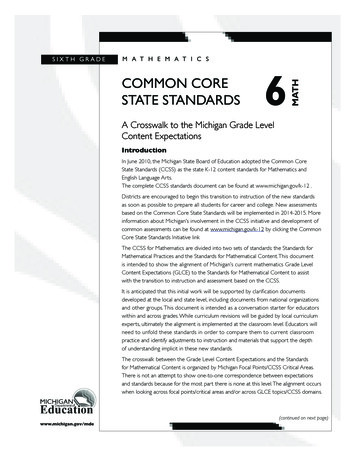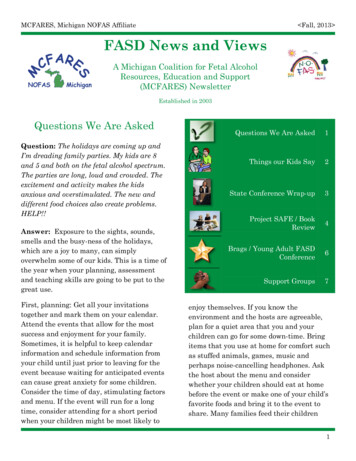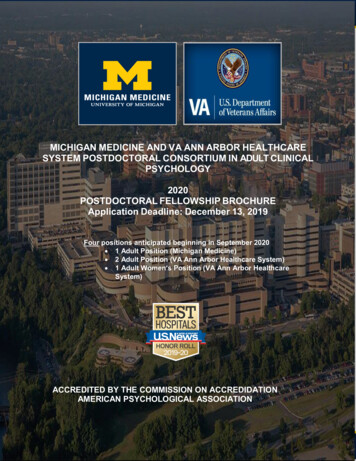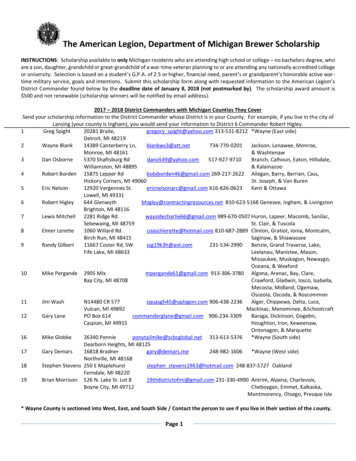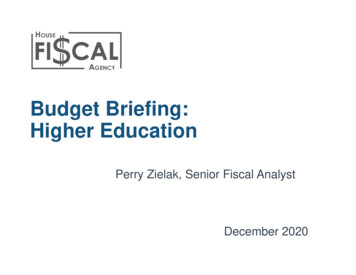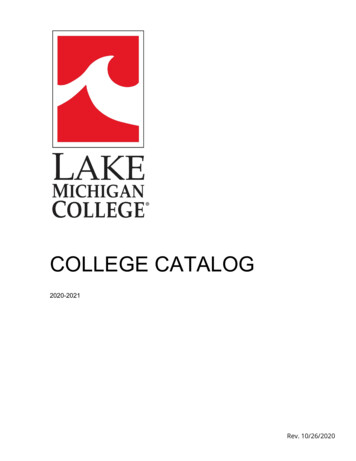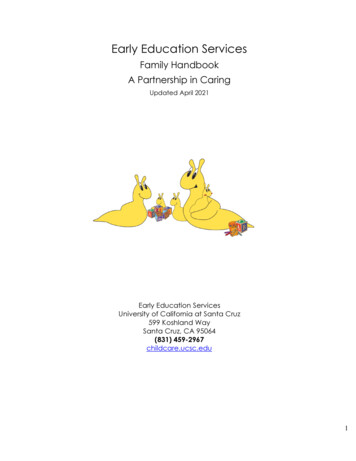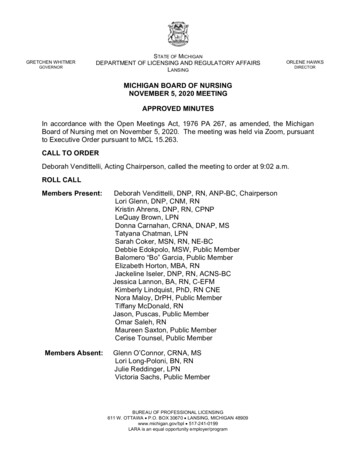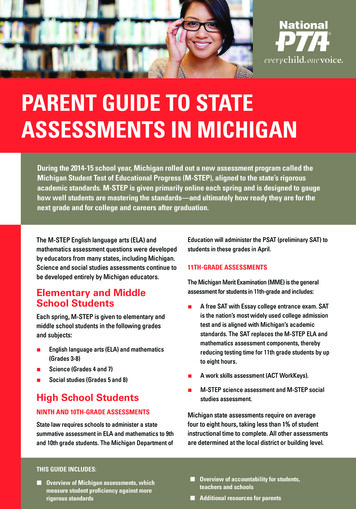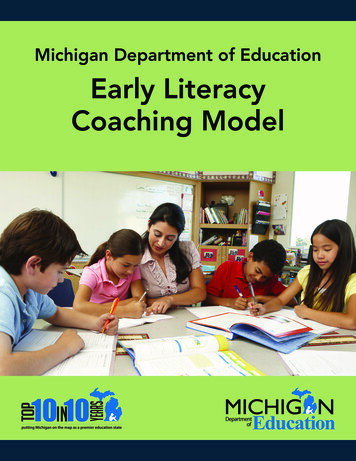
Transcription
Michigan Department of EducationEarly LiteracyCoaching Model
AcknowledgementsDr. Venessa A. Keesler, Deputy Superintendent, Educator, Student, and School Supports,Michigan Department of EducationDr. Paula Y. Daniels, Director, Office of Educational Supports, Michigan Department ofEducationDr. Susan L’Allier, Department of Literacy Education, Northern Illinois UniversityLisa Brown, Early Literacy Coaching Consultant, Michigan Department of EducationErin Brown, Project Coordinator, Early Literacy Professional Learning Grant, MAISAVic Bugni, Formative Assessment Consultant, Michigan Department of EducationDr. Steve Goodman, Director of Michigan’s Integrated Behavior and Learning SupportInitiativeMischele McManus, Great Start Readiness Program (GSRP) ConsultantNaomi Norman, Early Literacy Task Force Co-Chair; Assistant Superintendent, WashtenawIntermediate School DistrictKaren Ruple, Manager, MI Excel Statewide System of SupportLaural Triebel, Early Literacy Coaching Consultant, Michigan Department of EducationMichigan State Board of EducationRichard ZeileCo-PresidentCasandra E. UlbrichCo-PresidentMichelle FecteauSecretaryTom McMillinTreasurerLupe Ramos-MontignyNASBE DelegatePamela PughNikki SnyderEileen WeiserGovernor Rick SnyderEx OfficioMs. Sheila A. AllesChairmanEx OfficioInterim State Superintendent
ContentsAcknowledgements2Coaching Model Introduction4Coaching Continuum:5Coaching Model Continuum6Essential 1: Coaching Qualifications6Essential 2: Apply Adult Learning Principles8Essential 3: Build Collaborative Relationships10Essential 4: Commitment to Literacy12Essential 5: Time with Teachers14Essential 6: Coaching Activities16Essential 7: Literacy Leadership Teams20Early Literacy Coaching Model Resources:22Version 1.0 January 20183
Coaching Model IntroductionMay 2018Welcome to the Michigan Department of Education Early Literacy Coaching Model. For Michigan tobecome a Top 10 education state in 10 years by 2025, we must focus on quality instruction and studentoutcomes. No matter where students live, they should have access to the same high-quality educationalopportunities as any other student in Michigan. Likewise, teachers across the state should have equitableopportunities to learn and excel in their profession no matter where they live and teach.The Early Literacy Coaching Model was created in response to MCL.380.1280f also referred to asMichigan’s Read by Grade Three Law. The model is aligned to the General Educational LeadershipNetwork (GELN) Early Literacy Task Force (ELTF) Essential Coaching Practices in Elementary Literacy andsupports the Essential Instructional Practices in Early Literacy. The purpose of the model is to supportIntermediate School Districts (ISDs) and Local Educational Agencies (LEAs) to understand and implementresearch-supported literacy coaching practices that should support strong coaching programs and driveprofessional learning around literacy coaching throughout the state. Literacy coaching can providepowerful job-embedded, ongoing professional development with a primary goal of enhancing classroomliteracy instruction through improving teacher expertise. Effective literacy coaching supports teachers tosuccessfully navigate the daily challenges they face in their classrooms. As a result, instructional capacityand sustainability within the schools increases. In addition, through improving teacher expertise and thequality of core instruction, student achievement increases.The Early Literacy Coaching Model includes a graphic, coaching continuum, and resources.Coaching Model Graphic:This graphic provides a visual road map of the literacy coaching model. A video introduction is availablehere.Research-Supported Early LiteracyCoaching k with Teachers, LiteracyCoaches, and Literacy LeadersConferencingModelingApplying Assessment LiteracyObservingCo-PlanningWork asLiteracy LeaderCommittee MemberPresenterFacilitatorLiaisonMentorLiteracy Coach QualificationsSpecialized Literacy Knowledge and SkillsKnowledge and Use of Adult Learning PrinciplesDispositions and Skills to Build Collaborative Relationships4Version 1.0 January 2018
Coaching Continuum:The coaching continuum, found on the following pages, should be used in conjunction with the EssentialCoaching Practices in Elementary Literacy. The indicators are intended to provide specific examplesof behavior to guide growth in the practice of literacy coaching. Coaches and leaders can use thecontinuum to imagine solutions and remove barriers towards successful coaching practices. Thecontinuum should not be viewed as an evaluative rubric.The Early Literacy Coaching Model is based on the Essential Coaching Practices for Elementary Literacyand can be used in some of the following ways at an ISD, District, and Building Level to support literacycoaching that enhances classroom instruction and improves teacher expertise: When writing a job description for a K-3 literacy coach,»» Refer to Essential 1 when determining required and preferred qualifications»» Refer to Essentials 5 and 6 when describing primary position responsibilities When discussing/reviewing the K-3 literacy coach’s schedule with the coach,»» Refer to Essentials 5, 6, and 7 to make sure there is the correct balance of time spent coachingteachers and on other literacy leadership tasks When determining how an administrator can best support the K-3 literacy coach,»» Refer to Essential 4 When helping the K-3 literacy coach design a self-assessment,»» Refer particularly to Essentials 2, 3, 5, 6, and 7 to be sure that all key aspects of literacy coachingare included When reviewing the literacy coaching program at your school or within your district,»» Discuss all 7 Essentials with your coach/coaches to determine areas that need strengthening andsteps that will be taken to address those areasCoaching Model Philosophy:Based on the demands of the 21st century workforce, there is a sense of urgency and priority to improveliteracy proficiency in Michigan. Given these demands, the state must adopt a systematic approachto literacy coaching. The literacy coaching model is a research-supported approach that sets forth theessentials of high quality coaching for Michigan educators. The model is designed to build both teacherand coach capacity and sustainability around effective literacy instruction and is evidence of Michigan’scommitment to improve literacy in the state.Coaching Model Values/Guiding Principles:The early literacy coaching model is guided by the following principles: All students should have access to high quality tier one instruction that includes the EssentialInstructional Practices in Early Literacy.Literacy coaching is a form of high quality, job-embedded, professional learning and, in Michigan,should focus on the Essential Instructional Practices in Early Literacy.The early literacy coaching model is aligned to the Essential Coaching Practices for Elementary Literacydocument.Literacy coaching is included as part of a school-wide system of learning supported by the EssentialSchool-Wide and Center-Wide Practices in Early Literacy and is an administrator supported multi-yearinitiative.Coaching Model Desired Outcomes: Literacy coaching can provide powerful job-embedded ongoing professional development with aprimary goal of enhancing classroom literacy instruction through improving teacher expertise.Instructional capacity and sustainability within the schools increases.Through improving teacher expertise and the quality of core instruction, student achievementincreases.Version 1.0 January 20185
Coaching Model Continuum1. Effective literacy coaches have specialized literacyknowledge and skills beyond that of initial teacherpreparation.Essential 1: Coaching QualificationsCitation ofResearch Used:Bean, R. M., Draper, J. A., Hall, V., Vandermolen, J., & Zigmond, N. (2010).Coaches and coaching in Reading First schools: A reality check. The ElementarySchool Journal, 111(1), 87-114. Vanderburg, M., & Stephens, D. (2010). Theimpact of literacy coaches: What teachers value and how teachers change. TheElementary School Journal, 111(1), 141-163.Elish-Piper, L., & L’Allier, S. (2010). Exploring the relationship between literacycoaching and student reading achievement in grades K-1. Literacy Research andInstruction, 49, 162-174.Elish-Piper, L., & L’Allier, S. (2011). Examining the relationship between literacycoaching and student reading gains in grades K-3. The Elementary SchoolJournal, 112(1), 83-106.Vanderburg, M., & Stephens, D. (2010). The impact of literacy coaches: Whatteachers value and how teachers change. The Elementary School Journal,111(1), 141-163.Definition:Effective literacy coaches have specialized knowledge and skills aboutliteracy and adult learning beyond that of initial teacher preparation.Contribution toTeachers report (Bean, Draper, Hall, Vandermolen, & Zigmond, 2015;Desired Outcome: Vanderburg & Stephens, 2010) that literacy coaches need advanced literacyknowledge and skills in order to carry out their responsibilities such as modelingresearch-informed literacy practices, helping teachers analyze assessment dataand solve instructional problems, and recommending appropriate materialsand resources. When literacy coaches have completed advanced courseworkin literacy and been successful classroom teachers, students of teachers theycoached exhibited more literacy growth than students of teachers coached byliteracy coaches who had not completed advanced coursework in literacy (ElishPiper & L’Allier, 2010, 2011).6Version 1.0 January 2018
1. Effective literacy coaches have specialized literacy knowledge and skills beyond that of initial teacher preparation.Accomplished UseDevelopmental UseIneffective UseLiteracy Coaches:Literacy Coaches:Literacy Coaches: have an in-depth knowledgeof both reading and writingprocesses and acquisition. lack an in-depth knowledgeof both reading and writingprocesses and acquisition. have an in-depth knowledgein how to recognize the variedpurposes for assessment(e.g., screening, diagnostic,monitoring progress,achievement), select specificassessments that meet thosepurposes, administer andscore assessments, and useassessment results to informinstruction.are working toward an indepth knowledge of readingand/or writing processes andacquisition. have an in-depth knowledge ofand appropriately use researchinformed instructional practices(Essential Instructional Practicesin Early Literacy K-3) to helpall students develop literacyknowledge, skills, and abilities.are working toward an in-depthknowledge in some of thefollowing; how to recognizethe varied purposes forassessment (e.g., screening,diagnostic, monitoringprogress, achievement), selectspecific assessments that meetthose purposes, administer andscore assessments, and useassessment results to informinstruction.lack an in-depth knowledge ofhow to recognize the variedpurposes for assessment(e.g., screening, diagnostic,monitoring progress,achievement), select specificassessments that meet thosepurposes, administer andscore assessments, and useassessment results to informinstruction. lack in-depth knowledge orappropriate use of researchinformed instructional practices(Essential Instructional Practicesin Early Literacy K-3) to helpall students develop literacyknowledge, skills, and abilities. lack knowledge of adultlearning principles. are unable to create a learningenvironment that does notshow an understanding ofhow the physical arrangement,materials, group work, routines,and motivational factorssuch as choice and purposecontribute to learning in today’sdiverse classrooms. do not have classroom teachingexperience. have not completed advancedcoursework or completedprofessional developmentin evidence-based literacyinstructional strategies. have an in-depth knowledge ofadult learning principles. are able to create a literatelearning environment thatshows an understanding ofhow the physical arrangement,materials, group work, routines,and motivational factorssuch as choice and purposecontribute to learning in today’sdiverse classrooms. have successful classroomteaching experience at thePre-K to 3 level as evidencedby positive student learning.have a master’s degreein literacy or reading andcontinually engage inprofessional developmentin evidence-based literacyinstructional strategies. are working toward an in-depthknowledge and appropriateuse of research-informedinstructional practices (EssentialInstructional Practices inEarly Literacy K-3) to helpall students develop literacyknowledge, skills, and abilities. are working toward an in-depthknowledge of adult learningprinciples. are working toward being ableto create a literate learningenvironment that showsan understanding of howthe physical arrangement,materials, group work, routines,and motivational factors suchas choice and purpose intoday’s diverse classrooms. have classroom teachingexperience but not at thePre-K to 3 level. have completed advancedcoursework in reading orhave completed professionaldevelopment in evidencebased literacy instructionalstrategies.Consistently - engages in the behavior each time there is an opportunity to demonstrate the behaviorInconsistently - misses opportunities to demonstrate the behaviorVersion 1.0 January 20187
2. Effective literacy coaches apply adult learning principlesin their work.Essential 2: Apply Adult Learning PrinciplesCitation of Research Used:Dunst, C. J., Trivette, C. M., & Hamby, D. W. (2010). Meta-analysis of theeffectiveness of four adult learning methods and strategies. InternationalJournal of Continuing Education & Lifelong Learning, 3(1), 91-112.Definition:Effective literacy coaches apply their specialized knowledge aboutadult learning principles when working with educators.Contribution to DesiredOutcome:When literacy coaches incorporate adult learning principles into theirwork, educators are more likely to8 incorporate the research-informed strategies about which they learn. evaluate the results of the research-informed strategies theyimplement. reflect on their own acquisition of knowledge and skills.Version 1.0 January 2018
2. Effective literacy coaches apply adult learning principles in their work.Accomplished UseDevelopmental UseIn partnership with teacher(s), thecoach consistently:In partnership with teacher(s),the coach inconsistently: supports educator interestby focusing their coachingon classroom instructionalpractices that foster studentliteracy development. supports educator interestby focusing their coachingon classroom instructionalpractices that foster studentliteracy development. involves the educators withwhom they work in theplanning, implementation, andevaluation of their learning/practice. involves the educators withwhom they work in theplanning, implementation, andevaluation of their learning/practice. guides educators to reflectdeeply on their practice, withparticular attention to thebenefits and obstacles relatedto the implementation ofresearch-informed strategieswith their learners. guides educators to reflectdeeply on their practice, withparticular attention to thebenefits and obstacles relatedto the implementation ofresearch-informed strategieswith their learners. assists educators to integratenew knowledge and researchinformed strategies byproviding explicit explanationsabout how new concepts andresearch-informed strategiesare similar and different fromconcepts/strategies theycurrently know/use. assists educators to integratenew knowledge and researchinformed strategies byproviding explicit explanationsabout how new concepts andresearch-informed strategiesare similar and different fromconcepts/strategies theycurrently know/use.Ineffective UseThe coach does not: support educator interestby focusing their coachingon classroom instructionalpractices that foster studentliteracy development involve the educators withwhom they work in theplanning, implementation, andevaluation of their learning/practice. guide educators to reflectdeeply on their practice anddo not encourage teachersto pay particular attention tothe benefits and obstaclesrelated to the implementationof research-informed strategieswith their learners. assist educators to integratenew knowledge and researchinformed strategies becausethey fail to provide explicitexplanations about hownew concepts and researchinformed strategies are similarand different from concepts/strategies the teachers currentlyknow/use.Consistently - engages in the behavior each time there is an opportunity to demonstrate the behaviorInconsistently - misses opportunities to demonstrate the behaviorVersion 1.0 January 20189
3. Whether working with large groups, small groups, orindividual teachers, effective literacy coaches demonstratespecific skills and dispositions in order to engage teachersand build collaborative relationships.Essential 3: Build Collaborative RelationshipsCitation of Research Used:Calo, K. M., Sturtevant, E. G., & Kopfman, K. M. (2015). Literacycoaches’ perspectives of themselves as literacy leaders: Results froma national study of K-12 literacy coaching and leadership. LiteracyResearch and Instruction, 54(1), 1-18.Gibson, S. A. (2006). Lesson observation and feedback: The practice ofan expert reading coach. Reading Research and Instruction, 45(4), 295318.Rainville, K. N., & Jones, S. (2008). Situated identities: Power andpositioning in the work of a literacy coach. The Reading Teacher, 61(6),440-448.Vanderburg, M., & Stephens, D. (2010). The impact of literacy coaches:What teachers value and how teachers change. The Elementary SchoolJournal, 111(1), 141-163.Definition:Whether working with large groups, small groups, or individualteachers, effective literacy coaches demonstrate specific skills anddispositions in order to engage teachers and build collaborativerelationships.Contribution to DesiredOutcome:Creating and building a trusting environment allows teachers to takerisks and try new things that will support student achievement withoutthe fear of getting in trouble or doing something wrong.10Version 1.0 January 2018
3. Whether working with large groups, small groups, or individual teachers, effective literacy coaches demonstratespecific skills and dispositions in order to engage teachers and build collaborative relationships.Accomplished UseDevelopmental UseIn partnership with teacher(s), thecoach consistently:In partnership with teacher(s),the coach inconsistently: uses a variety of strategiesto establish rapport and trustas the initial steps in buildingcollaborative relationships(e.g., one-on-one conversationsabout teaching or studentlearning in general, attendinggrade level/team meetings asan interested listener/learner,finding specific resources/materials for a teacher). uses strategies to establishrapport and trust as the initialsteps in building collaborativerelationships (e.g., one-on-oneconversations about teachingor student learning in general,attending grade level/teammeetings as an interestedlistener/learner, finding specificresources/materials for ateacher). strives to determine theunderlying beliefs aboutliteracy of the teachers withwhom they are working inorder to develop collaborativerelationships. strives to determine theunderlying beliefs aboutliteracy of the teachers withwhom they are working inorder to develop collaborativerelationships. engages in conversations withteachers, that is encouragingand supportive, not evaluative. positions themselves as colearners and/or facilitators ofteacher learning. Ineffective UseThe coach does not: use strategies to establishrapport and trust as the initialsteps in building collaborativerelationships (e.g., one-on-oneconversations about teachingor student learning in general,attending grade level/teammeetings as an interestedlistener/learner, finding specificresources/materials for ateacher). strive to determine theunderlying beliefs aboutliteracy of the teachers withwhom they are working inorder to develop collaborativerelationships.engages in conversations withteachers that is encouragingand supportive, not evaluative. engage in conversations withteachers that is encouragingand supportive, not evaluative. positions themselves as colearners and/or facilitators ofteacher learning. position themselves as colearners and/or facilitators ofteacher learning.intentionally collaborates withteachers to set specific goalsfor their work with a respect forteachers’ time and expertise. intentionally collaborates withteachers to set specific goalsfor their work with a respect forteachers’ time and expertise. intentionally collaborate withteachers to set specific goalsfor their work with a respect forteachers’ time and expertise. demonstrates flexibility bybeing open to conversationsand questions as they arise—conversations and questionsthat may lead to moreintentional coaching. demonstrates flexibility bybeing open to conversationsand questions as they arise—conversations and questionsthat may lead to moreintentional coaching. reflects—regarding theirdemonstration teaching,their observations ofteacher’s instruction, and theconversations they have withteachers. reflects—regarding theirdemonstration teaching,their observations ofteacher’s instruction, and theconversations they have withteachers.demonstrate flexibility bybeing open to conversationsand questions as they arise—conversations and questionsthat may lead to moreintentional coaching. reflect—regarding theirdemonstration teaching,their observations ofteacher’s instruction, and theconversations they have withteachers.Consistently - engages in the behavior each time there is an opportunity to demonstrate the behaviorInconsistently - misses opportunities to demonstrate the behaviorVersion 1.0 January 201811
4. Literacy coaching is most effective when it is done within amulti-year school-wide or district-wide initiative focused onstudent learning and is supported by building and districtadministrators.Essential 4: Commitment to LiteracyCitation of Research Used:Burch, P., & Spillane, J. P. (2003). Elementary school leadershipstrategies and subject matter: Reforming mathematics and literacyinstruction. The Elementary School Journal, 103(5), 519-535.Calo, K. M., Sturtevant, E. G., & Kopfman, K. M. (2015). Literacycoaches’ perspectives of themselves as literacy leaders: Results froma national study of K-12 literacy coaching and leadership. LiteracyResearch and Instruction, 54(1), 1-18.Matsumura, L. C., Sartoris, M., Bickel, D. D., & Garnier, H. E. (2009).Leadership for literacy coaching: The principal’s role in launching a newcoaching program. Educational Administration Quarterly, 45(5), 655-693.Definition:Early literacy coaching is done within a multi-year school-wide ordistrict-wide initiative focused on student learning and is supportedby building and district administrators.Contribution to DesiredOutcome:Literacy coaching is most effective when it is done within a multi-yearschool-wide or district-wide initiative focused on student learning andis supported by building and district administrators. Research resultsindicate that initiatives, including those that involve a literacy coachingcomponent, may require three to five years to show impact on studentlearning. Support from building and district administrators is evidencedin various ways.12Version 1.0 January 2018
4. Literacy coaching is most effective when it is done within a multi-year school-wide or district-wide initiative focused onstudent learning and is supported by building and district administrators.Accomplished UseMost literacy coaching is alignedto school-wide or districtwide initiatives that focus onstudent literacy learning (e.g.,implementation of the EssentialInstructional Practices in EarlyLiteracy).To promote a high level ofparticipation in coaching, leadersconsistently:Developmental UseIneffective UseSome literacy coaching isaligned to school-wide ordistrict-wide initiatives that focuson student literacy learning(e.g., implementation of theEssential Instructional Practicesin Early Literacy).Most literacy coaching is notaligned to school-wide ordistrict-wide initiatives that focuson student literacy learning(e.g., implementation of theEssential Instructional Practicesin Early Literacy).To promote teacher participation incoaching, leaders inconsistently:To promote teacher participation incoaching, leaders do not: present the coach as a sourceof literacy expertise. present the coach as a sourceof literacy expertise. present the coach as a sourceof literacy expertise. actively participate inprofessional developmentsessions designed for coachesand administrators. actively participate inprofessional developmentsessions designed for coachesand administrators. actively participate in activitiesfacilitated by the coaches(e.g., modeling instruction,conferring with teachers). actively participate in activitiesfacilitated by the coaches(e.g., modeling instruction,conferring with teachers).actively participate in theprofessional developmentsessions designed for coachesand administrators. exhibit respect for the coachesas valued professionals. exhibit respect for the coachesas valued professionals.actively participate in activitiesfacilitated by the coaches(e.g., modeling instruction,conferring with teachers). give coaches autonomy overtheir schedules. give coaches autonomy overtheir schedules.exhibit respect for the coachesas valued professionals. give coaches autonomy overtheir schedules.To strongly support literacycoaches, leaders consistently:To support literacy coaches, leadersinconsistently: present the coach to theteachers. clearly describe and endorsethe coaching foci to theteachers.clearly describe the coachingfoci to the teachers. explicitly encourage teachers towork with their coach. explicitly encourage teachers towork with their coach. observe coaches’ work withteachers. explicitly communicate tocoaches personally how muchtheir work is valued. present the coach as sourcesof literacy expertise to theteachers.To support literacy coaches, leadersdo not: present the coach as sourcesof literacy expertise to theteachers. observe the coaches’ work withteachers.clearly describe and endorsethe coaching foci to theteachers. explicitly communicate tocoaches personally how muchtheir work is valued.explicitly encourage teachers towork with their coach. observe coaches’ work withteachers. explicitly communicate tocoaches personally how muchtheir work is valued.Consistently - engages in the behavior each time there is an opportunity to demonstrate the behaviorInconsistently - misses opportunities to demonstrate the behaviorVersion 1.0 January 201813
5. Effective literacy coaches spend most of their time workingwith teachers to enhance teacher practice and improvestudent learning. They make effective use of their time byusing a multi-faceted approach to coaching.Essential 5: Time with TeachersCitation of Research Used:Bean, R. M., Draper, J. A., Hall, V., Vandermolen, J., & Zigmond, N.(2010). Coaches and coaching in Reading First schools: A reality check.The Elementary School Journal, 111(1), 87-114.De Alba-Johnson, N., Rodriguez, M., Arias, L., Johnson, C. Z.,McConnell, S., McEvoy, M. et al. (2004, April). Is professional trainingenough? The effect of coaching in the practice of early literacyinstruction. Paper presented at the annual meeting of the AmericanEducational Research Association, San Diego, CA.Elish-Piper, L., & L’Allier, S. (2011). Examining the relationship betweenliteracy coaching and student reading gains in grades K-3. TheElementary School Journal, 112(1), 83-106.Matsumura, L. C., Garnier, H. E., & Spybrook, J. (2013). Literacycoaching to improve student reading achievement: A multi-levelmediation model. Learning and Instruction, 25, 35-48.Salzman, J. A., Rosemary, C. A., Newman,D. O., Clay, D. A., & Lenhart,L. A. (2008, April). Connecting teacher practice to improvement instudent reading achievement in Ohio’s Reading First Schools. Paperpresented at the annual meeting of the American Educational ResearchAssociation, New York, NY.Definition:Effective literacy coaches spend most of their time working withteachers to enhance teacher practice and improve student learning.They make effective use of their time by using a multi-facetedapproach to coaching.Contribution to DesiredOutcome:More time spent coaching with teachers has been associated withhigher student achievement at both the school and coach level. Lesstime spent coaching with teachers reduces the time spent addressingliteracy initiatives and lowers teachers’ perceptions about how helpfulcoaches are.14Version 1.0 January 2018
5. Effective literacy coaches spend most of their time working with teachers to enhance teacher practice and improvestudent learning. They make effective use of their time by using a multi-faceted approach to coaching.Accomplished UseDevelopmental UseIn partnership with teacher(s), thecoach consistently:In partnership with teacher(s),the coach inconsistently: Spends more than half of theirtime working directly withteachers. Spends between a third andhalf of their time workingdirectly with teachers. Focuses their coaching onhelping teachers Focuses their coaching onhelping teachers align their beliefs withresearch-informedinstructional practices andenhance their: classroom literacyenvironments classroom literacyenvironments use of researchinformed literacystrategies use of researchinformed literacystrategies implementation of newliteracy programs andstrategies use of practices alignedwith state standardsor curricular initiativessuch as the EssentialInstructional Practicesin Early Literacy. Has an on-going system tomonitor their time and revisetheir schedules to ensure thatmore time is spent workingdirectly with teachers and lesstime is spent on managerialtasks (e.g., maintaining anassessment database, orderingmaterials) or attendingmeetings not directly related totheir
The Early Literacy Coaching Model is based on the . Essential Coaching Practices for Elementary Literacy. and can be used in some of the following ways at an ISD, District, and Building Level to support literacy coaching that enhances classroom instruction and improves teacher expertise:
